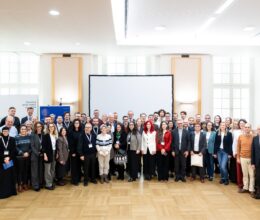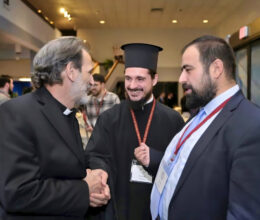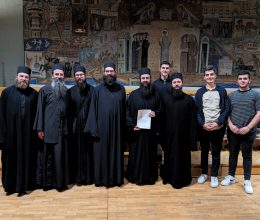Upon prior invitation from the distinguished organizers – the Konrad-Adenauer-Stiftung (KAS) and the Wilfried Martens Centre for European Studies – the Monastery of St. John the Baptist – Bigorski took part in the international conference Religious Diplomacy between the West and the East: The role of religion in contemporary European Affairs held from July 9 to 12 on the island of Syros, Greece. Representing the monastery was our brother, Archimandrite Kiril, who, with the blessing of the Elder, His Grace Bishop Parthenius of Antania, travelled to Greece to convey the monastic voice at this important inter-Christian gathering.
The conference took place in the light of the 1700th anniversary of the First Ecumenical Council in Nicaea – an event of immense significance for the entirety of Christian history and ecclesiological consciousness, particularly in the context of modern challenges facing Christianity in Europe.
Archimandrite Kiril delivered a presentation during the third thematic session, entitled Positions of the churches on topical socio-political issues. He spoke on the topic: An Orthodox Response to the Digital Age and Contemporary Socio-Cultural Challenges, with a particular focus on the issues posed by the rapid development of so-called Artificial Intelligence (AI), data-based digital systems, Large Language Models (LLMs), bioengineering, transhumanism, and new forms of virtual existence. Addressing the audience, he posed the question: “How can a person remain a person in the world of algorithms and avatars?” Conveying the thoughts of his Elder, Bishop Parthenius, he emphasized that modern digital trends often aim to reduce the human being to a “user,” “profile,” or “data set,” thereby undermining the ontological wholeness of the person. In contrast to these reductionist models, the Church bears witness to man as the image of God, created for communion, for participation in God, and for transformation—not as a technological project, but as a being called to theosis.
Furthermore, he highlighted Orthodox anthropology grounded in the Incarnation of Christ, according to which the human body is not merely an information carrier, but the very locus of salvation. This mystery, he said, is endangered in an age that separates the body from experience, and liturgical life from personal presence. “Without the body, there is no person; without presence, there is no Eucharist; and without the Eucharist – there is no authentic community,” he underlined. He also emphasized the necessity of a renewed asceticism—not as a withdrawal from the world, but as the transformation of everyday life: fasting not only from food, but from noise, from screens, from digital hyperstimulation. “Even in this new era, the Church has something vital to offer – interior stillness, prayer, personal presence, and authentic relationship.”
Addressing issues such as migration, poverty, political polarization, and secularization, Archimandrite Kiril stressed the need to restore the sacred and the theocentric into public life through liturgical culture, spiritual education, and the Church’s works of mercy. Technology, he noted, is not inherently good or evil, but must remain the servant of the human person, not its idol. Toward the end of his address, he issued a call for spiritual discernment as a new form of asceticism in the digital age – the ability to distinguish the beneficial from the destructive, to safeguard personhood and presence, and to defend the mystery of human dignity.
The international character of the conference was further reinforced by the presence of numerous eminent representatives from the Orthodox and Catholic worlds, the academic community, and European institutions and foundations. Among them were:
-
His Eminence, Metropolitan Dorotheos B, Orthodox Bishop of Syros, Tinos, Mykonos and the islands (Greece)
-
His Eminence Sevastianos Rossolatos, Archbishop, Former Archbishop of the Catholic Archdiocese of Athens; Apostolic Administrator of the Diocese of Syros and Thira; Apostolic Administrator of the Diocese of Crete (Greece)
-
Abbot Dr. Nikodemus C. Schnabel, O.S.B., Abbot of the Dormition Abbey on Jerusalem’s Mount Zion and the Tabgha Priory on Lake Gennesaret; Director of the Jerusalem Institute of the Görres Society (JIGG); Delegate of the Pontifical Athenaeum Sant’Anselmo for the “Theologisches Studienjahr Jerusalem” (Holy Lands)
-
Archimandrite Philadelphos Kafalis, Protosyncellus (Vicar General-Chancellor), Metropolis of Belgium and Exarchate of the Netherlands and Luxembourg, Ecumenical Patriarchate (Belgium)
-
Prof. Dr. Stefanos Athanasiou, Orthodox Theology, LMU Munich; Protobresbyter (Archpriest), Metropolis of Switzerland, Ecumenical Patriarchate (Switzerland)
-
Prof. Rene Micallef SJ, Professor, Pontifical Gregorian University (Malta – The Vatican State)
-
Dr. Jakob Ohm, Chairman, socioMovens Foundation for Promoting Catholic Social Teaching in Central and Eastern Europe; Parish Priest of the Archdiocese of Paderborn (Germany)
-
Stefan von Kempis, Head, German-language Department at Vatican Radio (The Vatican State)
-
Dr. Konstantinos Mygdalis, Advisor of the Interparliamentary Assembly of Orthodoxy (Greece)
-
Dr. Lars Hänsel, Head of the Department Europe / North America, Konrad-Adenauer Foundation (Germany)
-
Marian Wendt, Director, Konrad-Adenauer Foundation, Office for Greece & Cyprus (Greece)
-
Dr. Nino Galetti, Director, Konrad-Adenauer Foundation, Office for Italy, Malta & the Vatican State (Italy)
-
Dr. Federico Ottavio Reho, Strategic Coordinator and Senior Research Officer, Wilfried Martens Centre for European Studies (Belgium)
-
Dr. Marco Schrage, Visiting Professor, Accademia Alfonsiana – Pontifical Higher Institute of Moral Theology (The Vatican State)
-
Fr. Pascal Klose, diocesan Priest, Diocese of Trier; Licentiate Candidate, Judaic Studies and Jewish-Christian Relations, Gregorian University; former KAS Scholar (Italy–Germany)
-
Goran Trpchevski, Permanent Scientific Associate, Interparliamentary Assembly on Orthodoxy (North Macedonia)
-
Vladimir Stošić, Research Associate, University of Regensburg; PhD-Candidate at Chemnitz University of Technology (Germany)
-
Eleftherios Petropoulos, Senior Research Associate – Project Manager, Konrad-Adenauer Foundation, Greece & Cyprus Office (Greece)
-
Panos Tasiopoulos, Head of External Cooperation and Events, Wilfried Martens Centre for European Studies (Belgium)
Through this participation, the Bigorski Monastery once again offered its humble contribution to pan-European Christian symposia, bearing witness to the light of the Orthodox tradition in the face of the contemporary challenges of European society and the prevailing cultural matrix.















